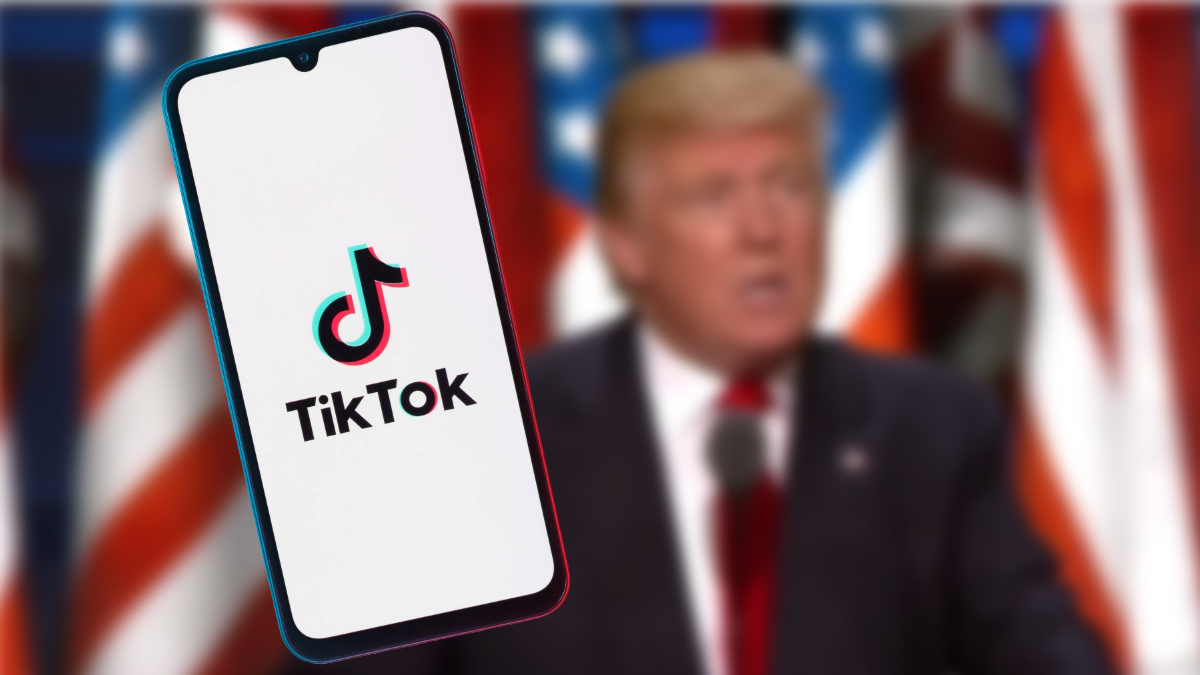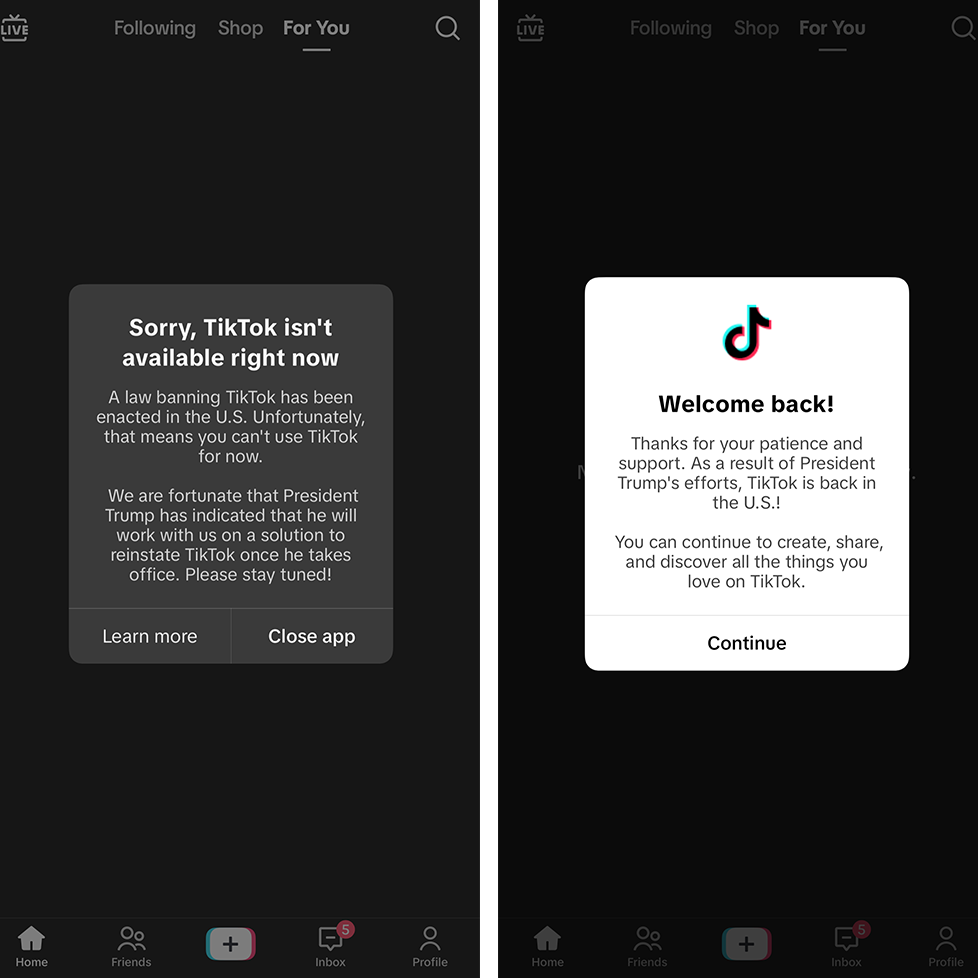For the People, Against Their Will: The Blunder of Banning TikTok
Nasser Eledroos / Jan 28, 2025
Composite. Shutterstock/VOA
The conversation surrounding TikTok — whether to ban it, regulate it, or embrace it — has become emblematic of a broader problem within the US: the persistent inability of the political class to connect with the cultural and technological realities shaping younger generations.
Leaders don’t get the TikTok generation
Used by 170 million Americans, TikTok is where virality and authenticity converge. Ordinary people participate in cultural dialogues that may require significant clout or resources on platforms like YouTube and Instagram. TikTok’s algorithm doesn’t just amplify voices; it disrupts the traditional gatekeeping structures of content creation, rewarding creativity and individuality instead of polish and production value. Platforms like Reddit and YouTube also foster community discourse, but TikTok's immediacy and cultural turnover are unparalleled—blink, and you might miss the next viral moment.
Once a simple video app, TikTok now steers both culture and commerce. It has breathed life into forgotten songs, rocketed obscure books to bestseller status, galvanized young people to demand justice in Gaza, and amplified calls for racial justice and police reform in the wake of George Floyd’s murder. The platform's influence extends from common parlance (see phrases such as 'girl dinner') to visual style, as users document their lives in Wes Anderson-inspired shorts or adopt other aesthetics. TikTok affects every industry: publishers chase BookTok discussions, beauty trends shift with each new viral moment, and coffee orders become cultural currency. Modern life has been rewired, with the platform driving changes in markets from real estate to restaurants, from Billboard charts to fraternity row.
TikTok's appeal stems from its authenticity. It distinguishes itself from Instagram and YouTube's carefully curated content by embracing raw, confessional moments. This cultural norm, established early in the platform’s history, has created an environment legacy apps cannot replicate, regardless of their attempts to copy TikTok’s features. Even LinkedIn copied TikTok. The failure of platforms like Instagram to capture this authenticity highlights TikTok’s unique position in the social media ecosystem.
The Ban and the Blunder
This cultural phenomenon is at the center of a geopolitical tug-of-war. TikTok’s Chinese ownership raises legitimate concerns about data privacy and national security. Congress exposes its hypocrisy and short-sightedness in how it handles these concerns. The Democratic Party, for instance, played a critical role in passing legislation aimed at banning TikTok, only to find itself outmaneuvered by President Trump. He joined TikTok last year during his campaign for a second term, growing his following to 15 million users and crediting the app for helping him win over young voters.

Image: TikTok displayed an outage message (left) to users on Saturday night, January 18, 2025. When service resumed Sunday morning, all 170 million US users received a notification (right) upon reopening the app.
The Democrats’ approach to TikTok — and technology in general — highlights a troubling refusal to read the room. Instead of capitalizing on the platform’s potential to engage with younger voters (55% of TikTok news consumers are Democrats), they chose to antagonize it, inadvertently handing Trump a political win by setting him up to be TikTok’s savior. Democrats didn’t just make a tactical error; they revealed a fundamental disconnect from a generation that grew up with the internet as its primary public square.
The debate to ban TikTok also exposes a glaring double standard in how the US treats different types of Chinese-made products and services. TikTok’s youth-centric appeal seems to have made it a scapegoat, while Chinese-owned services like Shein and Temu operate in the US with minimal scrutiny. The only one politicians complain about is TikTok.
This myopic approach undermines the credibility of the US government and, as a result, its ability to address real national security concerns. If policymakers were serious about data privacy, they wouldn’t focus solely on TikTok; they’d push for comprehensive privacy legislation that holds all tech companies accountable. But rather than create genuine regulatory frameworks, the government resorts to political stunts to shield American tech companies from their failure to innovate.
Ironically, TikTok’s short-lived ban has inadvertently spurred a remarkable cultural exchange. Over 700,000 American users migrated to Xiaohongshu (Red Note) in just a few days, making it the most downloaded app in the Apple US App Store. This influx has transformed a corner of the Chinese platform into a space for “digital diplomacy” between Chinese and American users — an exchange impossible on TikTok, which remains banned in China while Douyin serves mainland users. By engaging directly, users are humanizing one another, fostering an understanding that official diplomacy often fails to achieve. Americans learn about Chinese Walmart and the lives of Chinese citizens, who in turn learn about American pick-up trucks and the lives we lead. This mirrors cross-strait relations between Taiwan and China, where people-to-people interactions have softened political tensions. Congress ignored protecting our data for so long that some Americans decided to cut out the middleman and mail their data straight to Beijing.
Performance over policy
Some see the ban as a dangerous miscarriage of security policy — they argue it's a dangerous precedent for controlling free expression. The American Civil Liberties Union (ACLU) argues that banning TikTok violates the First Amendment, an argument the US Supreme Court rejected. If the ban is indeed about controlling narratives, as some suggest, it reveals a government more concerned with managing perceptions than addressing the underlying causes of public dissatisfaction.
Ultimately, the TikTok saga reflects a political establishment more interested in performance than policy. Both parties dodge responsibility for the ban while failing their constituents in distinct ways. For Democrats, the lesson should be clear: stop giving easy wins to opponents by underestimating the cultural and technological forces shaping the electorate. Republicans should heed a different lesson: tolerating TikTok while ignoring broader issues of tech accountability and misinformation reeks of opportunism rather than principled governance. (No one should forget that one of Trump’s motivations to keep TikTok online was, as he put it, because “Americans deserve to see our exciting Inauguration on Monday, as well as other events and conversations.”)
The TikTok ban may prove to be a flashpoint, but it reveals the underlying disconnect between Washington and the realities of modern life. Closing that gap requires more than partisan maneuvering; it demands a willingness to engage with the world as it is, not as politicians wish it to be.
Authors
